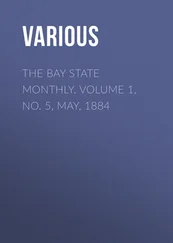Various - The Bay State Monthly. Volume 2, No. 4, January, 1885
Здесь есть возможность читать онлайн «Various - The Bay State Monthly. Volume 2, No. 4, January, 1885» — ознакомительный отрывок электронной книги совершенно бесплатно, а после прочтения отрывка купить полную версию. В некоторых случаях можно слушать аудио, скачать через торрент в формате fb2 и присутствует краткое содержание. Жанр: foreign_antique, periodic, foreign_edu, на английском языке. Описание произведения, (предисловие) а так же отзывы посетителей доступны на портале библиотеки ЛибКат.
- Название:The Bay State Monthly. Volume 2, No. 4, January, 1885
- Автор:
- Жанр:
- Год:неизвестен
- ISBN:нет данных
- Рейтинг книги:5 / 5. Голосов: 1
-
Избранное:Добавить в избранное
- Отзывы:
-
Ваша оценка:
- 100
- 1
- 2
- 3
- 4
- 5
The Bay State Monthly. Volume 2, No. 4, January, 1885: краткое содержание, описание и аннотация
Предлагаем к чтению аннотацию, описание, краткое содержание или предисловие (зависит от того, что написал сам автор книги «The Bay State Monthly. Volume 2, No. 4, January, 1885»). Если вы не нашли необходимую информацию о книге — напишите в комментариях, мы постараемся отыскать её.
The Bay State Monthly. Volume 2, No. 4, January, 1885 — читать онлайн ознакомительный отрывок
Ниже представлен текст книги, разбитый по страницам. Система сохранения места последней прочитанной страницы, позволяет с удобством читать онлайн бесплатно книгу «The Bay State Monthly. Volume 2, No. 4, January, 1885», без необходимости каждый раз заново искать на чём Вы остановились. Поставьте закладку, и сможете в любой момент перейти на страницу, на которой закончили чтение.
Интервал:
Закладка:
Various
The Bay State Monthly – Volume 2, No. 4, January, 1885
GEORGE DEXTER ROBINSON
His Excellency George D. Robinson, at present the foremost citizen of Massachusetts, by reason of his incumbency of the highest office in the Commonwealth, is the thirtieth in the line of succession of the men who have held the office of Governor under the Constitution. In character, in ability, in education, and in those things generally which mark the representative citizen of New England, he is a worthy successor of the best men who have been called to the Chief Magistracy. His public career has been marked by dignity and an untiring fidelity to duty; his life as a private citizen has been such as to win for him the respect and good will of all who know him. He is a man in whom the people who confer honor upon him find themselves also honored. He is a native of the Commonwealth, of whose laws he is the chief administrator, and comes of that sturdy stock which wresting a new country from savagery, fostered with patient industry the germs of civilization it had planted, and aided in developing into a nation the colonies that, throwing off the yoke of foreign tyranny, presented to the world an example of government founded on the equal rights of the governed and existing by and with the consent of the people. His ancestors were probably of that Saxon race which for centuries stood up against the encroachments of Norman kings and nobles, which was led with willingness into the battle, the siege or the crusade that meant the maintenance or advancement of old England’s honor, or in the cause of mother Church, and which was possessed of that brave, independent spirit that, when the old home was felt to be too narrow an abode, sought a new-country in which to plant and develop its ideas of what government should be. However this may be it is certain that from the first settlement of the Massachusetts Bay Colony the family was always represented among the most honorable of its yeomanry, and among its members were pillars of both Church and State. His immediate ancestors, people of the historic town of Lexington, were active citizens in the Revolutionary period, and in the great struggle members of the family were among those who did brave and effective service in the cause of liberty.
George Dexter Robinson was born in Lexington, February 20, 1834. Born on a farm, his boyhood and youth were spent there, and his naturally strong constitution was improved by the outdoor exercise and labor which are part of the life of the farmer’s boy. But the future Governor did not intend to devote himself to farming. With the aim of obtaining a collegiate education he attended the Academy in his native town, and followed his studies there by further preparation at the Hopkins Classical School in Cambridge. Entering Harvard University he was graduated at that institution in 1856, and receiving an appointment as Principal of the High School in Chicopee, Massachusetts, he accepted it, filling the position with success during a period of nine years. He retired from it in 1865. Meanwhile he had devoted much time to legal studies, which he continued more fully during the next few months, and in 1866 he was admitted to the bar in Cambridge. Chicopee, the town wherein his active career in life had begun, he made his permanent home, and with the various interests of that town he identified himself closely and pleasantly, exemplifying in many ways the character of a true townsman, and associating himself with every movement for the good of his fellow citizens. In 1873 he was elected to represent the town the ensuing year in the State Legislature, and as a member of the House he was noted for the promptness and fidelity with which he attended to his legislative duties. Two years later he was a member of the State Senate, and here, as in the House, he displayed conspicuous ability as a legislator in addition to that fidelity to his responsibilities which had long been characteristic of him in any and all positions. His qualifications for public life received still wider recognition the year he served in the Senate, and he was nominated by the Republicans of the old Eleventh District as Representative in Congress. He was re-elected for two successive terms, and after the re-apportionment was elected from the new Twelfth District in 1882, but before taking his seat was nominated by the Republicans for the office of Governor, to which he was elected. He took his seat, however, in order to assist in the organization of the new Congress, and, after that work was accomplished, resigned to enter upon the duties entrusted to him by the people of the whole Commonwealth. He had sat in the Forty-fifth, Forty-sixth, Forty-seventh and Forty-eighth Congresses. Of his career in Washington it would not be possible to give a better summary than one given by "Webb," the able Washington correspondent of the Boston Journal, which is here given in its entirety:
Mr. Robinson took his seat in the Forty-fifth Congress, which met in extra session, in October, 1877. He was prompt in his seat on the first day of the first session. Regularity in attendance, and constant attention to public business, have been characteristics of Mr. Robinson’s Congressional career. He is in his seat when the gavel falls in the morning; he never leaves it until the House adjourns at night. He does not spend his time in importuning the departments for clerkships, but he welcomes the civil service law. He does not take the public time, which belongs to his constituents, for his private practice in the United States Supreme Court. He is in the truest sense a representative of the people. He is quick in discovering, and vigorous in denouncing an abuse. He as quickly comprehends and as earnestly advocates a just cause. He is a safe guardian of the people’s money and has never cast his vote for an extravagant expenditure; but he does not oppose an appropriation to gain a reputation for economy, or aspire to secure the title of "watch dog of the Treasury," by resorting to the arts of a demagogue.
When he entered Congress, he went there with the sincerity of a student, determined to master the intricate, peculiar machinery of Congressional legislation. He has become an authority in parliamentary law, and is one of the ablest presiding officers in Congress.
In the Congress which he first entered the Democrats were in power in the House. "They had come back," as one of their Southern leaders (Ben Hill) said, "to their father’s house, and come to stay." Mr. Randall was elected Speaker. He put Mr. Robinson on one of the minor standing committees—that of Expenditures in the Department of Justice—and subsequently placed him near the foot of the list on the Special Committee on the Mississippi Levees. Before the latter committee had made much progress with its business, it was discovered that where "McGregor sits is the head of the table." Mr. Robinson, at the extra session of the Forty-fifth Congress, took little active part in the public proceedings. He was a student of Congressional rules and practice.
At the second session of the Forty-fifth Congress he began to actively participate in the debates, and from the outset endeavored to secure a much needed reform in Congressional proceedings. He always insisted that, in the discussion of important questions, order should be maintained. He followed every important bill in detail, and the questions which he directed to those who had these bills in charge showed that he had made himself a master of the subject. He took occasion to revise upon the floor many of the calculations of the Appropriations Committee, and to urge the necessity of the most rigid economy consistent with proper administration.
Читать дальшеИнтервал:
Закладка:
Похожие книги на «The Bay State Monthly. Volume 2, No. 4, January, 1885»
Представляем Вашему вниманию похожие книги на «The Bay State Monthly. Volume 2, No. 4, January, 1885» списком для выбора. Мы отобрали схожую по названию и смыслу литературу в надежде предоставить читателям больше вариантов отыскать новые, интересные, ещё непрочитанные произведения.
Обсуждение, отзывы о книге «The Bay State Monthly. Volume 2, No. 4, January, 1885» и просто собственные мнения читателей. Оставьте ваши комментарии, напишите, что Вы думаете о произведении, его смысле или главных героях. Укажите что конкретно понравилось, а что нет, и почему Вы так считаете.












